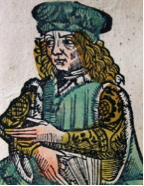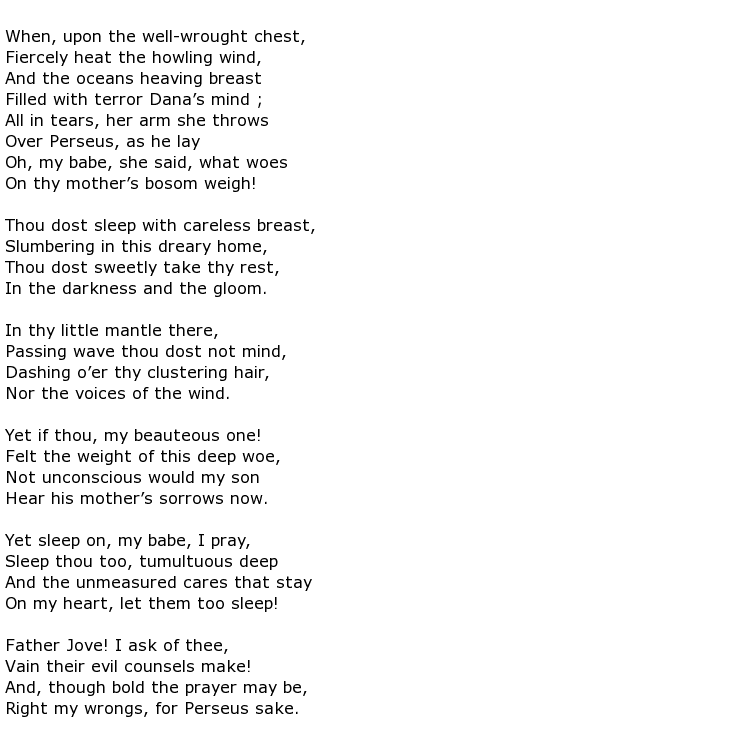 Better known as Simonides of Ceos, depicting the place where he was born, this was a 6th century BC Greek poet who became famous as much for his elegies as his romantic, lyrical poetry. He wrote a great deal about the fallen in great battles fought between the Greeks and the “Barbarians”, this term fitting almost any enemy who was not of the sophisticated Greek race. His words can often be found on plaques erected to commemorate these conflicts where you might find a line or two about the heroic escapades of brave Peloponnesian men. It is thought that he was one of the first (maybe THE first) to tell a story, in song format, of the victorious competitors at the early Olympic games; these were known as epinicions. He was succeeded in this by another famous poet – Pindar – who became famous for his Olympic victory writing.
Better known as Simonides of Ceos, depicting the place where he was born, this was a 6th century BC Greek poet who became famous as much for his elegies as his romantic, lyrical poetry. He wrote a great deal about the fallen in great battles fought between the Greeks and the “Barbarians”, this term fitting almost any enemy who was not of the sophisticated Greek race. His words can often be found on plaques erected to commemorate these conflicts where you might find a line or two about the heroic escapades of brave Peloponnesian men. It is thought that he was one of the first (maybe THE first) to tell a story, in song format, of the victorious competitors at the early Olympic games; these were known as epinicions. He was succeeded in this by another famous poet – Pindar – who became famous for his Olympic victory writing.
Simonides was born in the city of Ioulis which is on the island known then as Ceos, now called Kea. His birth year is recorded as 556 BC. As a youth he was drawn to the region of Attica, which included the capital Athens, and he spent the majority of his life here. It is believed that at one point he was invited to the court of Hieron, the so-called Tyrant of Syracuse, one of a number of tyrants of the Athenian Peisistratids. His talent for ode writing and describing the celebrations of great military victories kept him in favour at court and many of the epigrams to be found at Thermopyle are attributed to Simonides. One of his most famous ones commemorates the great battles between the Greeks and the Persians:

After the fall of the tyrants known as the Peisistratids, and the dawning of the age of democracy, Simonides resided in Athens and his lyrical writing skills contributed to a great deal of success in choral song compositions for dithyrambic competitions. He wrote extensively about military victories though, his verses including the commemoration of the fallen at the battle of Marathon as well as famous Greek victories of the Persian wars, such as the one at Thermopylae.
Although Simonides has been credited with a considerable literary output, very few pieces of his work remain and they are often referred to as “Fragments”. Here is Fragment 01:

His considerable skills were often called upon when someone died. His genius apparently extended beyond the ability to write moving verses to also include skilful and sensitive praise of the deceased person. In effect he was one of the first obituary writers of the ancient world. He certainly observed closely any significant events around him, taking a pragmatic, realistic view of things such as the ever-increasing numbers of merchants and traders that appeared to be exploiting markets wherever they found them. Other classic writers of his time perhaps glossed over man’s imperfections while Simonides described things, and people, as he saw them.
Another unusual thing about him, at that time at least, was that he was never afraid to demand payment for his work. While other writers saw their art as just that, Simonides saw it as a commercial opportunity. He was quite happy to literally write to order and some of the fragments of his work that were published in recent years included accounts of pederastic acts. Men having sexual relations with young boys was quite common in Ancient Greece and Simonides was quite content to write about it.
Unusually for these ancient time Simonides lived a long life. It is reported that he died in the year 468 BC. He was 88 years old.

